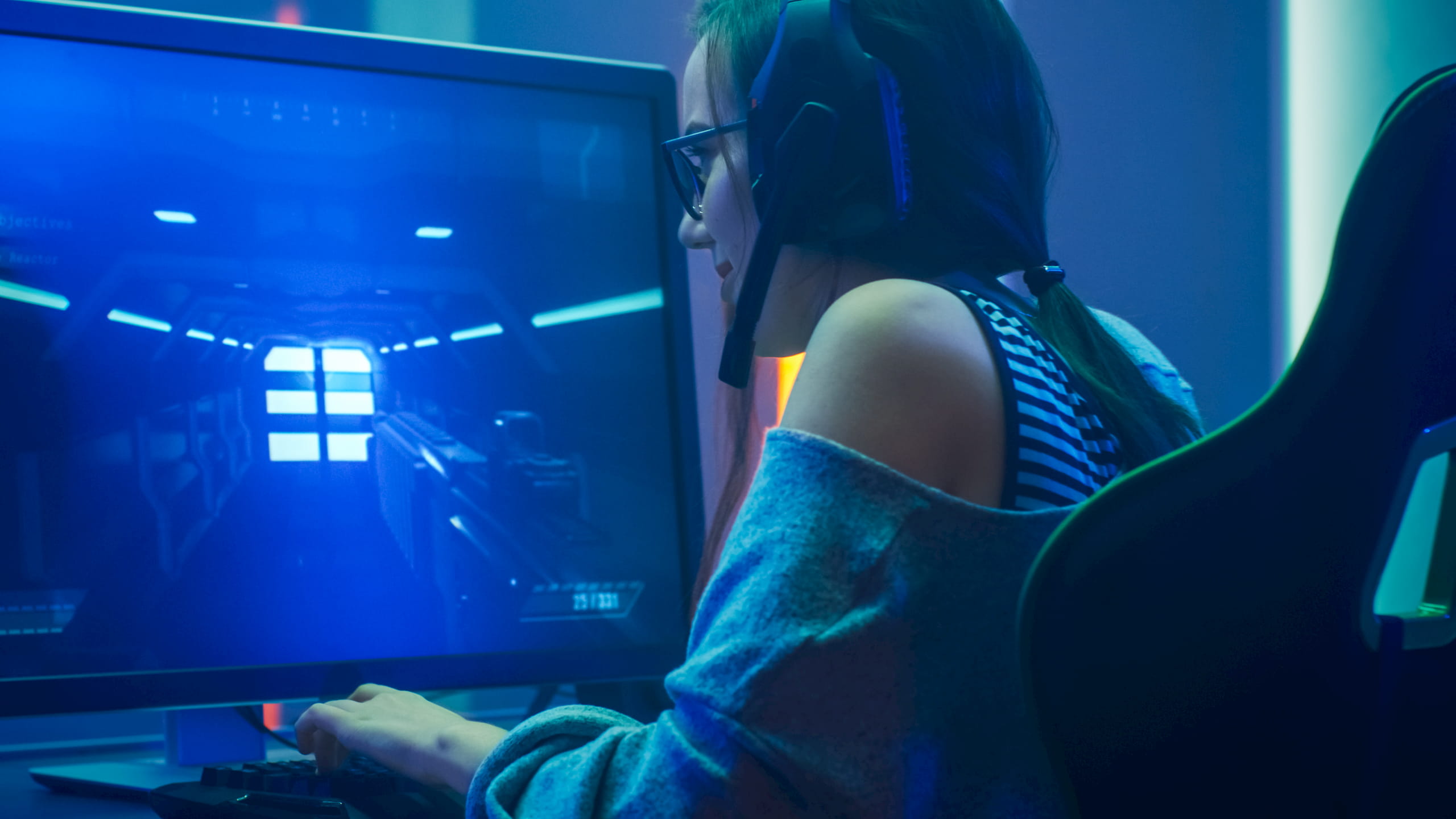Why Is Fiber Good for Gaming?
How a fiber internet connection gives you the edge in online gaming.
Aug 23, 2023 | Share
Gaming
Every gamer has experienced the woes of lag. You’ve got victory in the crosshairs and are about to unleash your game-winning moves; but just as you plunge down those decisive button presses, your screen bugs out in a scramble of jittery mayhem. You miss a shot that even the greenest of newbs couldn’t excuse away and lose the game. Awesome. Your connection stabilizes in time to hear a barrage of dismay from your teammates.
Latency sucks, and, unfortunately, you can’t eliminate it altogether. But with a top-notch internet connection and a little optimization, you can severely mitigate how often latency affects your gaming.
The most effective route is to upgrade to a fiber internet connection. No internet type is perfect, but fiber comes close as the fastest and most reliable internet connection you can get.
Find fiber internet providers.
Enter your zip code to immediately see what ISPs are in your area.
Lower latency
When discussing internet speed, it’s common to focus on bandwidth: the amount of data you can download per second. The speeds you see when you sign up for an internet plan are bandwidth speeds. But latency has the most impact on your gaming experience. Spoiler alert: fiber internet has the lowest average latency.
Latency (measured in milliseconds) is how long it takes data to travel from your computer to a server (such as a gaming server) and back. When gaming, latency affects how responsive your controls feel. If your latency is really bad, you’ll start noticing glitches and time sync issues, making it impossible to perform well.
In fact, low latency is so important that most multiplayer games include a ping reading on their scoreboards, which is a latency test to see how well your internet connection is performing in-game.
How bad is your latency?
Use our internet speed test to get a read on your internet connection’s latency and speeds.
Download speed
000 Mbps
Upload speed
000 Mbps
Latency (ping)
00 ms
Jitter
00 ms
Jitter
For silky-smooth gaming, you should also aim for low latency jitter. While latency measures how long it takes for the data to travel from one place to another, jitter represents the consistency of your latency. For example, if one command message has a latency reading of 15ms and the next has one of 150ms, that would constitute a bad jitter reading. When you have a lot of jitter, you experience the same kind of glitching and stuttering you get with high latency.
Fiber internet is best at providing low latency and low jitter. Fiber-optic cables use light pulses to transmit data, unlike cable and DSL, which use electrical signals over copper wire. Copper wire signals need more amplification and processing to cross the huge distances required when your home network transmits and receives data from the internet.
Fiber, on the other hand, is able to travel much further before requiring amplification and processing, which makes the connection faster and more stable; this translates to lower latency and jitter.
More reliable
Even worse than latency are internet drops and outages. Such occurrences mean you may spend hours in a game only to be dropped from the match as your internet connection shuts down or slows to a trickle.
Outages and slowdowns happen with every internet type and every ISP, but they happen less with fiber internet. Fiber-optic internet networks not only tend to be newer than cable or DSL networks, but there’s less processing required, which makes fiber networks more robust overall. We even found evidence of fiber’s higher reliability in our latest customer satisfaction survey, where a majority of fiber customers (73%) reported “never” or “rarely” experiencing internet outages compared to cable (53%) and DSL (49%).
More bandwidth (i.e. faster speeds)
Fiber also beats traditional internet speeds, which are often referred to as bandwidth and are measured in megabytes per second (Mbps). Almost all fiber ISPs offer at least gig speeds, and many offer multi-gig speeds.
High bandwidth isn’t a must-have for online gaming. Multiplayer games take up a very small amount of data per second—even just 5Mbps is usually more than enough. But a lot of games are delivered digitally, so you’ll have to download huge game files. Even after you download the game, most multiplayer titles often have large required updates as well. Fiber’s high speeds can make those downloads and updates go a lot quicker, which means less waiting and more gaming.
Twitch streaming and symmetrical speeds
If you stream or broadcast your gaming, you’ll definitely want fiber internet’s superior upload speeds. The internet speed numbers you see when signing up for an internet plan are the plan’s download speeds, which dictate how fast your network receives data from the internet. But certain activities, such as broadcasting a gaming stream, require more upload bandwidth.
Fiber internet has symmetrical speeds, meaning the upload speed is just as fast as the download speed. With other services, such as cable and DSL, upload speeds are much slower, usually only a small fraction of the download speeds.
How to find a fiber internet provider
It can get tricky to find all the internet providers in your area. A quick internet search often leads to sponsored results that may leave out that perfect ISP for your needs. Our zip code search tool helps you find all your local internet providers immediately. Give it a spin to find out if any fiber providers service your area.
What if there are no fiber providers in my area?
Because it requires significant infrastructure investments, many areas still don’t have access to fiber internet. Fiber optic internet is the best option for serious gamers, but that doesn’t mean you can’t get a good gaming experience from a different type of service.
If you can’t get fiber, we recommend going with cable or 5G fixed-wireless internet, which are both capable of delivering low-latency and high-bandwidth internet connections. They are also more widely available, so there’s a very good chance you have access to one, if not both.
How to optimize your internet connection for gaming
Aside from improving your internet connection, here are a few quick changes you can make to your home network that can have a huge impact on your gaming sessions.
1. Use an Ethernet cable instead of Wi-Fi
A wired Ethernet connection is a lot more stable than Wi-Fi. Wi-Fi uses radio waves to broadcast internet signals throughout your home, which are susceptible to interference from different materials, electronic devices, and other Wi-Fi networks. This is often the cause of a jittery and glitchy gaming experience.
Using an Ethernet cable to hardwire your router directly to your computer or gaming console mitigates lag and jitter by limiting signal interference. See our guide on connecting to your network using an Ethernet cable if you’re not sure how to do this.
2. Prioritize your gaming PC or console in your router’s settings
Many routers allow you to prioritize certain devices over others. Once set, your chosen device, like your gaming machine, will get your precious bandwidth ahead of anything else. The setting is called Quality of Service (QoS), though it may appear differently in different routers. If you need help with this, check our router settings guide.
3. Don’t use a Wi-Fi extender
Sometimes you can’t avoid using Wi-Fi for your gaming, but take extra care to avoid multiplayer gaming over a Wi-Fi extender. Most Wi-Fi extenders are technically Wi-Fi repeaters, which essentially copy the signal from your router and rebroadcast it. This doubles your latency, and likely negatively impacts your network jitter level. If you’re going to game over Wi-Fi, try to connect to the router directly.
FAQ
What’s the best type of internet connection for gaming?
Why is a fiber internet connection better than cable or DSL?
Author - Austin Aguirre
Austin worked as a broadband technician installing and troubleshooting countless home internet networks for some of the largest ISPs in the U.S. He became a freelance writer in 2020 specializing in software guides. After graduating with a BS in technical communication from Arizona State University, he joined the team at HighSpeedInternet.com where he focuses on home network improvement and troubleshooting.




